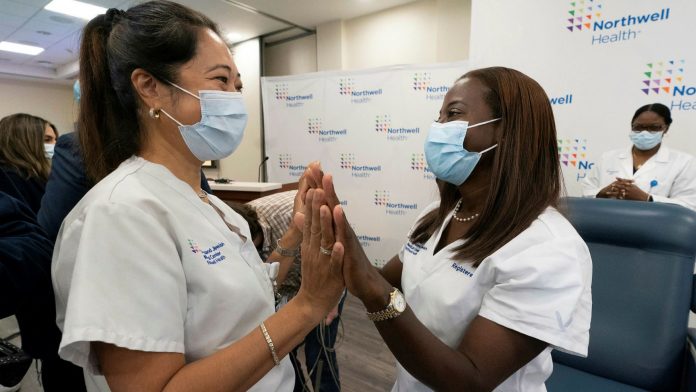US lawmakers have reached a deal on a nearly $900bn economic stimulus package that includes more relief for small businesses and direct payments to American families suffering in the coronavirus pandemic.
The deal — the second-largest economic relief bill in US history after the $2.2tn Cares Act in March — breaks months of deadlock at a time when the US economic recovery has shown signs of faltering.
“We can finally report what our nation has needed to hear for a very long time. More help is on the way,” Mitch McConnell, the Republican Senate majority leader, said on Sunday evening.
The deal with Nancy Pelosi, the Democratic speaker of the House, and Chuck Schumer, the Senate’s top Democrat, came just hours before funding was due to expire, risking a government shutdown days before Christmas.
The deal includes a $284.5bn extension of the Paycheck Protection Program for small businesses and more money to aid distribution of Covid-19 vaccines. The Federal Drug Administration on Friday authorised the use of Moderna’s jab, making it the second inoculation, after the Pfizer vaccine, to be approved for use in the US.
The Senate majority leader also said the package would “renew and extend” federal unemployment benefits for the millions of Americans who have lost their jobs in the pandemic, and include “another round of direct impact payments”. The Cares Act had included means-tested payments of up to $1,200 per American adult, though the latest package will provide cheques of up to $600 per individual, $1,200 per married couple and $600 per dependent child. The federal government will top-up unemployment insurance, which is administered by state governments, by $300 per week through to mid-March 2021.
The deal also includes $13bn for the Supplemental Nutrition Assistance Program, formerly known as food stamps, and $25bn in federal support for renters, among other provisions, such as more than $80bn in funding to help schools and universities conduct lessons in person during the pandemic. The package allocates $2bn for small US telecommunications companies to strip Huawei and ZTE equipment from their networks.
Because lawmakers had tied the Covid relief package to an annual spending bill to fund the federal government, Congress on Sunday was set to pass a stop-gap measure that would extend the government funding deadline to the end of Monday, and allow lawmakers to review the stimulus deal before voting on it.
Congressional leaders had insisted throughout last week that a deal was close. But negotiators hit a stumbling block on Thursday after Pat Toomey, the Republican senator from Pennsylvania, sought to insert language into the legislation that would prevent the Federal Reserve from reviving emergency credit facilities due to expire at the end of the year. A bipartisan agreement on that issue was struck late on Saturday after hours of intense negotiations.
The deal needs to be approved by the full Democratic-controlled House of Representatives and the Republican-held Senate before being sent to the White House for Mr Trump’s signature.
The Washington Post later reported that the White House had secured a controversial tax break for corporate meal expenses, something the president had said would aid the restaurant industry but economists warned was irrelevant to the current crisis.
Democrats had long pushed for a more sweeping stimulus package, and Joe Biden, the Democratic president-elect, has said passing additional economic stimulus would be a top priority for his administration
“In November, the American people spoke clearly that now is a time for action and compromise,” Mr Biden said in a statement.
“I am heartened to see members of Congress heed that message, reach across the aisle, and work together. This is a model for the challenging work ahead for our nation.”
Mrs Pelosi and Mr Schumer described Sunday’s agreement as “an important first step that Democrats look forward to building on under the new Biden-Harris Administration to meet the remaining needs of the American people during this historic health and economic crisis”.





